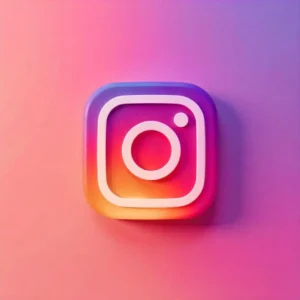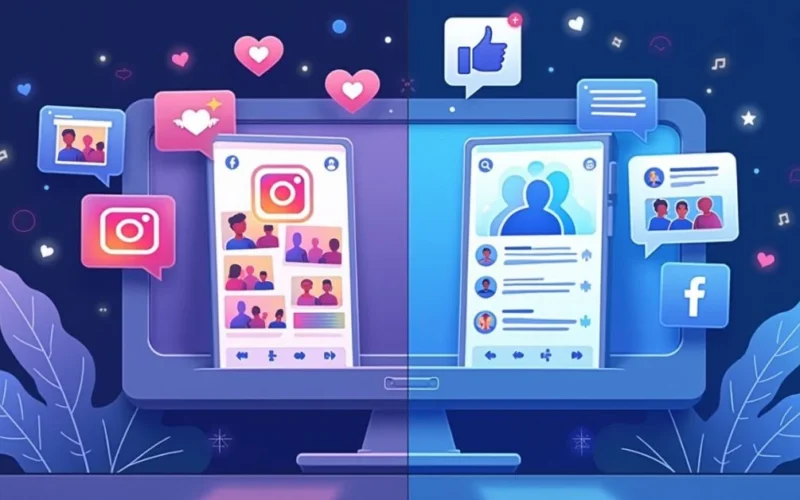Table of Contents
When it comes to social media, two names always come to mind: Instagram and Facebook. Both are powerful, popular, and owned by the same parent company, Meta. But each has different features, users, and purposes. Whether you’re a student, a business owner, or someone who just loves sharing, you may ask: Should I use Instagram or Facebook?
What Is Facebook?
 Facebook is one of the oldest and most used social media platforms. It launched in 2004 and quickly became a place where people could connect, share life updates, post photos, and join groups. Today, Facebook is more than just a place to chat with friends; it’s a hub for businesses, communities, and events.
Facebook is one of the oldest and most used social media platforms. It launched in 2004 and quickly became a place where people could connect, share life updates, post photos, and join groups. Today, Facebook is more than just a place to chat with friends; it’s a hub for businesses, communities, and events.
Key Features of Facebook:
- Write text posts, share photos, or upload videos
- Join groups based on interests like cooking, travel, or study
- Create events and invite others
- Use Messenger to chat privately
- Sell and buy products through Facebook Marketplace
- Follow news, pages, and influencers
- Run ads with detailed targeting options
What Is Instagram?
 Instagram is a photo and video sharing platform launched in 2010. It’s more visual than Facebook and focuses on creativity, beauty, and trends. People love using it to share their lifestyle, travel stories, food pictures, and fashion. It’s also a hotspot for influencers and brands.
Instagram is a photo and video sharing platform launched in 2010. It’s more visual than Facebook and focuses on creativity, beauty, and trends. People love using it to share their lifestyle, travel stories, food pictures, and fashion. It’s also a hotspot for influencers and brands.
Key Features of Instagram:
- Share photos or videos with filters
- Use Stories that disappear in 24 hours
- Post Reels for short, fun videos
- Explore content with hashtags
- DM (direct message) friends and followers
- Create engaging content with music and effects
- Run ads similar to Facebook
Instagram vs. Facebook: Key Differences Explained
Social media has become an essential part of everyday life, and two of the most influential platforms are Instagram and Facebook. While both are owned by Meta, they serve different purposes, attract different age groups, and offer unique features. Whether you’re a casual user, content creator, or business owner, understanding their differences can help you make the most out of each platform.
1. User Base
One of the biggest differences lies in who uses each platform. Instagram is especially popular with people aged 18 to 34, making it a hub for Millennials and Gen Z. It’s the go-to place for those who love trends, aesthetics, and visual storytelling.
On the other hand, Facebook appeals to a much wider age range, especially users over 30. Many older users prefer Facebook because it offers more room for reading, discussion, and social connections with family and old friends.
2. Content Type
Instagram is built around visuals. It thrives on photos, short videos, Reels, and Stories. The platform encourages quick, creative, and polished content. Users scroll through visuals with minimal text, making Instagram a great place to express personality and style in a bite-sized way.
Facebook, however, supports more diverse content formats. In addition to photos and videos, it allows users to post text updates, event invites, external links, and longer videos. This makes Facebook ideal for deeper communication, discussions, and storytelling.
3. Business and Marketing Use
Both platforms offer strong opportunities for marketing, but each supports different strategies.
1. Instagram works best for
- Fashion and beauty brands
- Travel and lifestyle pages
- Influencers and digital creators
- Short product demos and promotions
Its sleek layout and emphasis on visuals make it perfect for brands that want to showcase style and aesthetics.
2. Facebook is more suitable for
- Local businesses and services
- Event planning and promotion
- Community groups and fan clubs
- Detailed customer support
Facebook’s tools, like Groups, Events, and long-form posts, make it better for building deeper relationships with customers.
4. Features for Creators and Businesses
Instagram offers helpful tools like Business Profiles, Instagram Shopping, Story Highlights, and collaboration tools for influencers. It’s a mobile-first platform, great for real-time updates and product promotion.
Facebook, on the other hand, provides Business Pages, Facebook Shops, a powerful Ads Manager, and tools to create Groups or host Events. If you want advanced targeting and a wide range of customer interactions, Facebook has more robust tools.
5. Ease of Use
Instagram’s interface is clean, simple, and mobile-friendly. It’s easy for new users to understand and perfect for sharing content on the go. Facebook, while feature-rich, can feel cluttered and overwhelming to newcomers. With its many tools and menus, it takes some time to explore everything.
Who Should Use Instagram?
Instagram is perfect for people or businesses who:
- Want to build a visual brand
- Love posting creative photos or short videos
- Target younger users
- Focus on trends, influencers, or lifestyle content
- Want to grow fast through Reels and trending hashtags
For example, if you are a makeup artist, travel blogger, clothing brand, or chef, Instagram lets you show off your work visually and reach people quickly.
Who Should Use Facebook?
Facebook works best if you:
- Enjoy reading and sharing stories
- Want to join or manage interest-based groups
- Need to plan or promote events
- Have a local business and want to connect with your community
- Want to post long messages, share links, or talk about serious topics
If you’re a tutor, community leader, small business owner, or nonprofit organization, Facebook lets you build stronger relationships and keep in touch with your audience.
Social Showdown: Instagram or Facebook?
| Feature | ||
| Main Focus | Visual content (photos, short videos) | Text, links, events, and community building |
| Best For | Creators, influencers, lifestyle brands | Local businesses, families, and community groups |
| User Age Group | Mostly 18–34 years | 25+ years, broader audience |
| Content Style | Quick, visual, trendy | Informative, text-heavy, diverse |
| Popular Features | Reels, Stories, Filters, Highlights | Groups, Events, Marketplace, Long Posts |
| Ease of Use | Very simple and mobile-friendly | Feature-rich, but can feel cluttered |
| Link Sharing | Limited (mainly in bio and Stories) | Easy in posts and comments |
| Community Building | Harder through visuals only | Strong through Groups and Events |
| Business Tools | Shopping tags, Creator profiles, Reels Ads | Detailed Ads Manager, Shops, Business Pages |
| Viral Potential | High (through Reels and trends) | Moderate (less trendy but wide reach) |
| Best For Brands Like | Fashion, Food, Travel, Fitness | Education, Services, NGOs, Local Stores |
| Cross-Platform Sharing | Can link to Facebook easily | Can post to Instagram from Business Suite |
Can You Use Both?
 Yes! Many people use both platforms together. Since both are owned by Meta, you can:
Yes! Many people use both platforms together. Since both are owned by Meta, you can:
- Connect your Facebook and Instagram accounts
- Post to both at the same time using Meta Business Suite
- Run ads that appear on both apps
- Share Instagram Stories directly to Facebook
This gives you the best of both worlds. You can use Instagram to attract and engage new followers with visuals, and use Facebook to build deeper trust and run groups or events.
Future of Both Platforms
Meta continues to update both apps. Instagram is focusing more on video, especially Reels, while Facebook is building tools for community and commerce. No matter which platform you choose, the key is consistency. You must post regularly, engage with followers, and stay up to date with changes in the app.
Conclusion
Instagram and Facebook both offer powerful tools to connect, share, and grow online. The right one for you depends on your goals, your content, and your audience. If you’re a visual creator or brand targeting young people, Instagram is perfect. If you’re building a community, running a business, or want a broader audience, Facebook is ideal. Many people choose to get the best of both worlds.
Also read this: Remembering Instagram’s Golden Era






